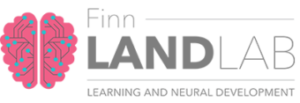LANGUAGE: WHY CAN'T ADULTS LEARN?
Language is perhaps the only known learning feat in which adults are worse than children. Why? This exception in learning may hold important clues about how the maturing mind and brain trades off between developmentally programmed strengths and limitations in learning. Our work has explored three factors that may contribute to adult’s poor learning relative to children. Counterintuitively (at least at first glance), these are all aspects of adult-cognition that underpin their success in other areas. These include adults’ (1) larger knowledge base, (2) mature, language-specific neural networks, and (3) mature executive functions and declarative memories.
BRAIN DEVELOPMENT, MEMORY SYSTEMS, & LEARNING
Neural and cognitive systems undergo vast change during childhood, so much so that it’s hard to know when certain systems are “in place” and even whether changes stop (never mind when). Our lab is particularly interested in the fact that changes in core memory systems happen at different rates, something that is tied to and possibly even caused by ongoing brain development. Our work seeks to understand what asynchronies in the developmental profiles of core memory systems means for learning across domains, especially for language learning and learning measured in educational contexts.
PLASTICITY & THE ENVIRONMENT
It is commonly presumed that early or accelerated development of memory systems, especially working memory, is desirable. However, this practice might impact the operation of other memory systems in unpredicted ways: decreasing working memory demands can facilitate the formation of procedural memories in adults and increasing them can have the opposite effect, interfering with the formation of new procedural memories. Slow development might be best.
Our work seeks to understand whether extended plasticity (openness to environmental input) is indeed best for memory ability and learning outcomes across domains—language and education. An important part of this work is characterizing children’s environments. Slow might not be best in less “enriching” and/or stressful environments that can be associated with poverty.
EDUCATION
We have also linked these memory systems to achievement in education. A long-term goal is to understand the nature of memory and learning mechanisms, and the developmental changes in these relationships. By understanding the nature of learning mechanism it may be possible to design more effective educational strategies that leads in turn to improved outcomes broadly. There is much left to do in exploring the development of these systems and relating them to real-world learning in language and gains in education.
